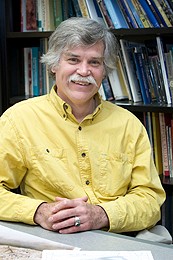
Distinguished Research Professor: Vern Scarborough
Its not as much that Vern Scarborough ever planned on being one of the worlds foremost experts on the history of sustainable water use its just the course of how his academic career evolved.
I was interested in water systems, and since I was born in Seaside, Oregon, it was like I was preadapted to this question, Scarborough laughs. Ive always loved the natural world and gravitated towards that kind of deep, logical reality, and when I got into archaeology, for whatever reason it was really the Maya and the American Southwest that drew my interests the Maya where they had too much water and the American Southwest where they had too little, and both those areas led me to these research questions.
The way that he has pursued those questions has helped place Scarborough among the highest ranks in his field, and has also earned his designation this year from UC of Distinguished Research Professor.
Scarboroughs prominence in his field is as hard to ignore as a roaring waterfall. His work has been plentiful and deep, and it has helped mold the terrain that surrounds his topic.
Scarborough is truly a leader in our field and his interdisciplinary work sets him apart from all others because he integrates ecology, water management, climatology and archaeology, says Joyce Marcus, the Robert L. Carneiro Distinguished University Professor of Social Evolution at the University of Michigan.
Adding that his work transcends anthropology, she also says: Unlike most scholars, his work has relevance to world economics, water management, sustainability, and is of direct relevance to our everyday life in the 21st century.
Nowhere is that relevance more apparent than the current work he is doing for UNESCO the United Nations Educational, Scientific and Cultural Organization. He has been selected by that organization as editor for a massive volume called Water and Humanity: A Historical Overview.
Colleague Brian Fagan, an emeritus professor of Anthropology at the University of California, Santa Barbara, describes the significance of Scarboroughs leadership on the project as (introducing) a broad body of international work on water management in the past to an audience much wider than merely archaeologists.
Fagan adds: Judging from results so far, his research will have profound influence on strategies for fostering self-sustainability in many parts of the world. His research will also be of great interest to people working on the long-term future, where water management is a primary concern.
For Scarborough, he sees in the history of the Maya and other civilizations thousands of years ago lessons that are applicable to the earths current environmental challenges.

Vern Scarborough
Today we have a nation-state built, in my belief, on technological breakthroughs. Were always looking at the way we can buffer ourselves from the environment and live yet more comfortably. Thats brought us wonderful things breakthroughs in medicine and economic well-being, and we live longer all these things have come as a result of that technological push, and thats great. But it comes at a cost, and thats my interest.
Scarborough has done extensive field work in Latin America for years, including current high-profile work at the site of the ancient Maya city of Tikal in Guatemala. There he has built the case for how the Maya leadership built and used large reservoirs to facilitate agriculture and as cisterns during a lengthy dry season, which in turn supported their power as ruling elites. He has matched that with extensive work at other ancient sites that helps form a comparative basis for what he sees in his work at Maya sites.
Out of that work emerged Scarboroughs book The Flow of Power: Ancient Water Systems and Landscapes, which truly established him as an international figure in his field.
Scarborough believes his work has not only revealed history, but also offers us a chance at lessons on modern-day challenges.
These civilizations took different pathways (than ours), and theres a great complexity to that, he says. The Maya and, to a degree, the Balinese are very different pathways. They considered: What were some of the other possibilities for state development that were less harsh on the environment? What things did they do where they werent necessarily trying to run from the environment or put up obstacles between themselves and the environment, the way we often do? They were more reverential.
It is consideration of those kinds of questions that keeps Scarborough moving forward in his research. He calls what hes doing learning lessons from voiceless societies that can help us with modern challenges, including most prominently, global climate change.
If we can integrate some of these past adaptations from other societies, we might have a softer landing, Scarborough believes. You have to talk to the ecologists and environmentalists, people working here and now, but also these historians, the archaeologists and the anthropologists who work with social structure. If we can bring all that information together, hopefully in the next 10 years well have a different model in how we might deal with some of these problems. Thats where sustainability comes into my work.
Related Stories
UC celebrates record graduating class at commencement
April 25, 2024
UC celebrated its doctoral hooding and master's recognition ceremony at Fifth Third Arena as part of its three-day commencement for the largest graduating class in university history.
The 2024 Toast recognizes achievements of Lindner’s Business...
April 25, 2024
The Carl H. Lindner College of Business Office of Inclusive Excellence hosted its annual Toast event for the Business Fellows program April 18 at The Graduate Hotel Cincinnati.
2024 Daniel Drake Medals to be awarded April 27
April 24, 2024
The UC College of Medicine will award three people with 2024 Daniel Drake Medals April 27.
